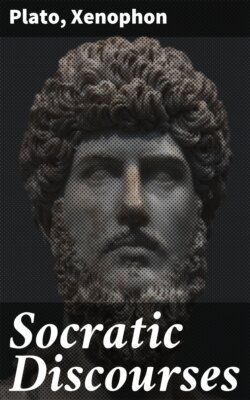Читать книгу Socratic Discourses - Xenophon - Страница 12
На сайте Литреса книга снята с продажи.
CHAPTER V
ОглавлениеTable of Contents
Temperance and self-control recommended: he that is destitute of temperance can be profitable or agreeable neither to himself nor others, sect. 1–4. Without temperance nothing can be learned or done with due effect, 5. Socrates not only encouraged to temperance by precepts, but by his example, 6.
1. If temperance, moreover, be an honourable and valuable quality in a man, let us consider whether he at all led (men) to it by reflections of the following kind. “If, my friends, when a war was coming upon us, we should wish to choose a man by whose exertions we might ourselves be preserved, and might gain the mastery over our enemies, should we select one whom we knew to be unable to resist gluttony, or wine, or sensuality, or fatigue, or sleep? How could we think that such a man would either serve us, or conquer our adversaries? 2. Or if, being at the close of life, we should wish to commit to any one the guardianship of our sons, or the care of our unmarried daughters, or the preservation of our property, should we think an intemperate man worthy of confidence for such purposes? Should we intrust to an intemperate slave our herds, our granaries, or the superintendence of our agriculture? Should we be willing to accept such a slave as an agent, or purveyor, even for nothing? 3. But if we would not even accept an intemperate slave, how can it be otherwise than important for every man to take care that he himself does not become such a character? For the intemperate man is not injurious to his neighbour and profitable to himself (like the avaricious, who, by despoiling others of their property, seem to enrich themselves), but, while he is mischievous to others, is still more mischievous to himself, if it is, indeed, mischievous in the highest degree, to ruin not only his family, but his body and mind. 4. In society, too, who could find pleasure in the company of such a man, who, he would be aware, felt more delight in eating and drinking than in intercourse with his friends, and preferred the company of harlots to that of his fellows? Is it not the duty of every man to consider that temperance is the foundation of every virtue, and to establish the observance of it in his mind before all things? 5. For who, without it, can either learn anything good, or sufficiently practise it? Who, that is a slave to pleasure, is not in an ill condition both as to his body and his mind? It appears to me, by Juno, that a freeman ought to pray that he may never meet with a slave of such a character, and that he who is a slave to pleasure should pray to the gods that he may find well-disposed masters; for by such means only can a man of that sort be saved.”
6. While such were the remarks that he made, he proved himself more a friend to temperance by his life than by his words; for he was not only superior to all corporeal pleasures, but also to those attendant on the acquisition of money; thinking that he who received money from any one, set up a master over himself, and submitted to a slavery as disgraceful as any that could be.
